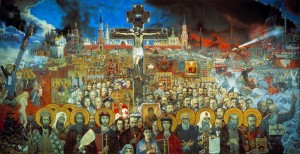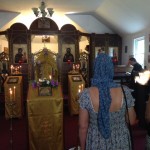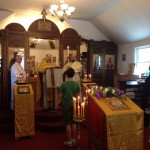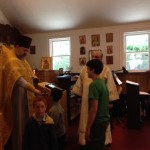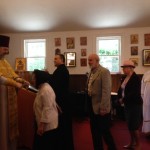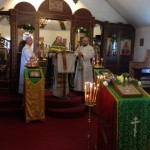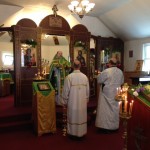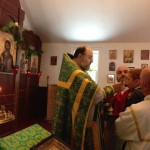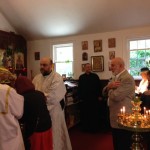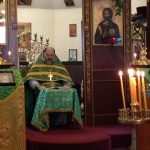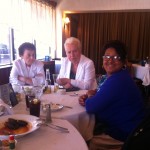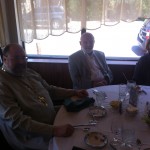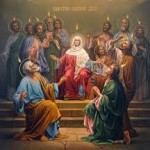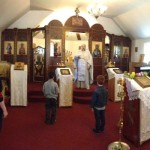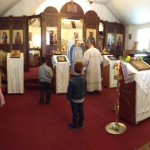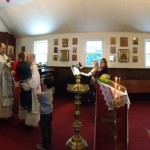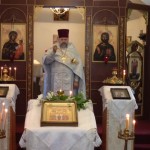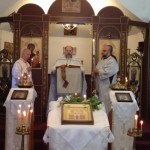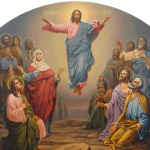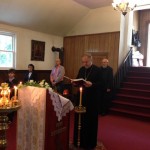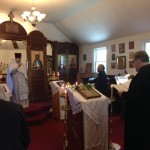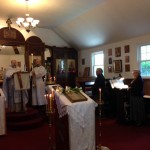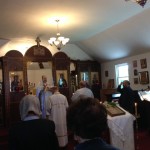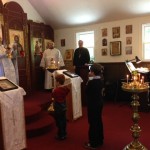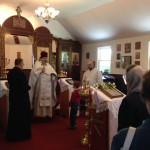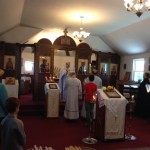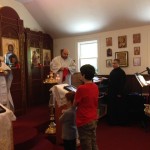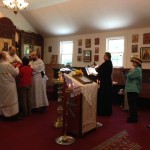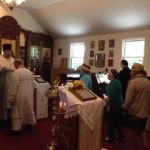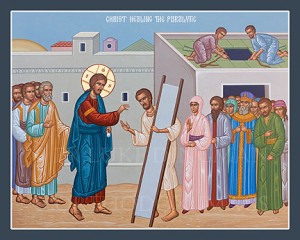On June 29, on the 3rd Sunday after Pentecost Archpriest Igor Tarasov, Rector of St. George Church served the Divine Liturgy in our temple.
Following the Gospel reading the Rector preached a homily:
“Today’s Epistle lesson is telling us about faith, hope and love. St. Paul teaches that we are justified not by the works of the Old Testament law, but by faith in Jesus Christ. Salvation comes from faith. And faith makes us acquire the grace of the Lord and makes us rejoice in hope of the glory of God (Rom. 5, 2). St. Paul assures us that hope in Jesus does not disappoint, “because the love of God has been poured out in our hearts by the Holy Spirit who was given to us” (Rom. 5, 5). St. Paul also says that the love of God is shown in the fact that God Himself died for us although we were sinners. “In due time Christ died for the ungodly” (Rom. 5, 6).”
“St. Paul further reflects upon that fact that Christ died for us who seemed to be unworthy of such sacrifice, saying that “scarcely for a righteous man will one die; yet perhaps for a good man someone would even dare to die” (Rom. 5, 7). He then comes to an important conclusion: “But God demonstrates His own love toward us, in that while we were still sinners, Christ died for us” (Rom. 5, 8).”
“God loved us always. He loved us although we were sinners. That is what makes God’s love so wonderful. He did not wait until we reformed and found our way back to Him. He did not wait until we loved Him. He loved us before that. He loved us while we still spurned and rejected His love. And He still does love all of us despite our sins. For us, Christians, it is important to remember that God loves us no matter what we are or what we do. However, we should not forget all the things which are wrong with us. We have to be realistic about our sins and our weaknesses and our unworthiness. At the same time we have to be optimistic and remember that God nevertheless loves us.”
“It can be compared to good parenting. A good parent will try to correct a child for wrong behavior, but not humiliate him as a person. There is a difference between a parent saying to a child, “The thing you did was wrong and I will not stand for that, because I love you too much to allow you to grow up with that kind of behavior,” or saying to the child, “You are a terrible person because you did such a thing”. God is like a good and wise parent. He does not like when we do wrong things but He does not belittle us for that. When we think of these things we come to a basic biblical truth: hate the sin but love the sinner. This is the way God loves us. He showed His love by dying for us while we were still sinners. God hates the sin but never withdraws His love from the sinner.”
“The Scripture tells us how God did actually love the sinners. Why did God love Moses or David or Paul or Zacchaeus? Did He love them because of their goodness? Certainly not! They were all sinners. Moses was a murderer. David was a murderer and adulterer. Paul was a persecutor of Christians. Zacchaeus was a thief, a dishonest tax collector. It was because God loved them in spite of their sins that they became Saints. Christ loved harlots and murderers and thieves and adulterers. He shed His precious blood to save them. It was the transforming power of His love that made these people new persons – the same love that can make us new persons.”
“Therefore, when the devil comes to us and tempts us with the thought, “How could God love me? I have been bad – no, God could never love me”, remind the tempter of other sinners before you, like Moses, David, Paul and Zacchaeus. Or, when the devil tempts us with the thought, “How could God love that person? He is so bad! How God could love a criminal, a pervert, a maniac, a godless scoffer?” – again, remind the tempter of other sinners who were loved by God, take him to the Cross, and confront him with the words of today’s Epistle lesson, “God demonstrates His own love toward us, in that while we were still sinners, Christ died for us” (Rom. 5, 8). Christ did not die for Saints. He died for sinners to make them Saints.”
“Today we commemorate St. Tychon, bishop of Amathus. While he was even a young man he performed a miracle. A certain gardener threw away the dried prunings of vines from the vineyard. St Tychon gathered them, planted them in his garden and prayed the Lord that these branches might take root and yield fruit for the health of people. The Lord did so through the faith of the holy youth. The branches took root, and their fruit had a particular and very pleasant taste. It was used during the lifetime of the saint and after his death for making wine for the Mystery of the Holy Eucharist. Something similar God does to us, the sinners. When we sin, we are like the dried branches. But God wishes to plant us and to restore us to life, so we can produce good fruits.”
“Dear brothers and sisters! Let us cherish our faith by which we are saved. Let us rejoice in the hope of Christ by which we understand that God loves us. Let us appreciate His love for He loved us even while we were sinners. And let us love Him in return to become Saints!”
After the dismissal of the Liturgy the Rector congratulated our parishioner and altar server Elisej Flora on his past name day and wished him God’s blessings and intercession of the Holy Prophet Elisha whose memory was celebrated on June 27. Traditional ”Mnogaia leta” was proclaimed and sung.
Following the service our parishioners and the Rector gathered at the table to enjoy coffee and refreshments.

